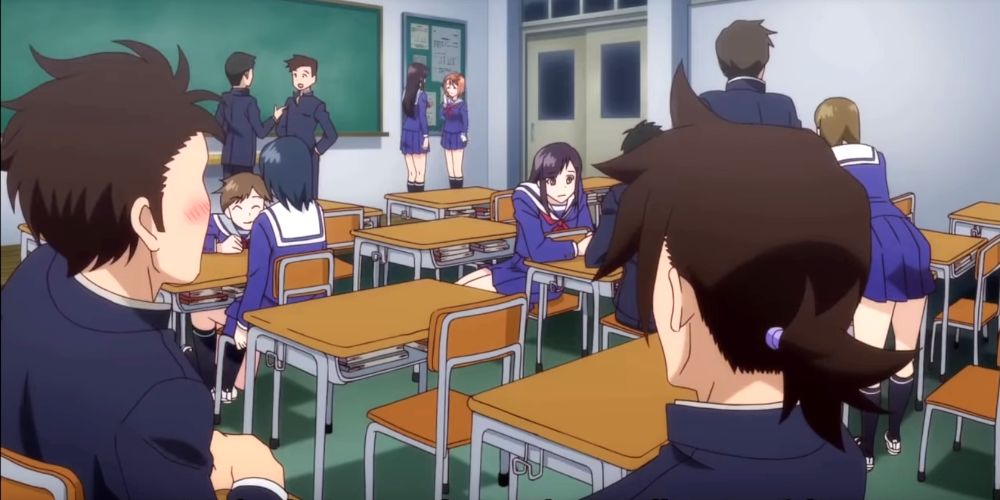Once you step foot into the world of anime, you'll come across tons of words that spark curiosity (and probably some confusion). While some of these words refer to types of anime, others pertain to the fans themselves.
If you want to hit up a nerdy convention or a explore an anime-related forum, you'll need to do some studying. Learning common anime terms will help you navigate the mind-boggling world of anime slang and lingo.
Keep in mind most of these words are rooted in Japanese, so they might not be pronounced the way you think.
A
Anime: A Japanese style of animation that usually takes the form of a TV show or movie. In Japan, the word means any type of animation from any country. However, North Americans (as you may already know) use the word "anime" in reference to animation made specifically in Japan.
Note: To avoid being shunned by anime fanatics, please do not confuse this term with manga (see below for definition).
B
Baka: A fool or a complete idiot. You'll hear this word used hundreds of times after watching enough anime.
C
Chibi: Describes someone (or something) short in stature that's also very cute. Some anime use chibi-style artwork, in which the characters are drawn with short bodies, giant heads, and tiny arms.
D
Doujinshi/Doujin: A manga made by an amateur artist. Some doujinshi contain characters from well-known anime, while others have completely original characters and storylines. You can even buy doujinshi online, and you'd be surprised that most of them are surprisingly high-quality.
E
Ecchi: An anime that has sexual elements, but isn't downright pornographic. Ecchi anime is supposed to be appropriate for all ages, as it commonly couples humor with sexual innuendos.
F
Fan Service: When an anime blatantly caters to fans. It comes in many different forms—some anime show scenes of barely-clothed characters, while others incorporate detailed shots of cars or machinery. In small doses, fan service is okay. When an anime takes fan service too far, it ruins the entire show.
G
Gaijin: The Japanese word for foreigners or people who aren't from Japan.
Ghibli: Ghibli (or Studio Ghibli) is a famous animation studio in Japan. Over the years it has produced some of the world's most beloved anime movies such as My Neighbor Totoro, Princess Mononoke, Spirited Away, and Kiki's Delivery Service. Watch one of them if you have the chance!
H
Harem: A genre of anime that features one (typically male) protagonist surrounded by a group of (typically female) love interests. Although this genre is dominated by male protagonists, some harem anime have reversed these gender roles.
Hentai: "Pervert" in Japanese. If you don't already have an idea of where this definition is headed, let me clear things up for you. Hentai is associated with sexually-explicit imagery, plots, and weird kinks, so don't click on an anime from the hentai genre when you're bored at work.
J
J-Pop: Japanese pop music. You'll usually get a taste of this music genre when listening to some anime intros.
K
Kawaii: Means "cute" in Japanese. Kawaii isn't just an adjective for something utterly adorable anymore—it's become a lifestyle. Certain types of clothes, food, and behavior are considered kawaii if they have a cute-enough charm.
L
Lolita: A Japanese fashion subculture that resembles Victorian-style trends. Lolita fashionistas put a twist on these extravagant Victorian-era outfits by making them overly cute or gothic.
Light Novel: A short novella usually under 300 pages. Every once in awhile, you might come across some artwork to go along with the text.
M
Manga: A Japanese graphic novel. It looks like a Western comic book, except a manga has a completely different art style, is read from right to left, and is usually printed in black and white. Manga also caters to a wide range of age groups and niches.
Mecha: A genre of anime or manga that incorporates large robots, called mechs, that are piloted by humans. The most well-known examples of the mech genre are the Gundam series and Neon Genesis Evangelion.
N
Neko: "Cat" in Japanese. In Japan cats don't meow, they "nyan."
O
Otaku: An anime fan to the extreme. In the Western world, the term is thrown around nonchalantly and usually refers to someone who loves anime. The connotation is a lot different in Japan—an otaku in japan is someone who never leaves their house and has an unhealthy obsession with anime.
OVA: An abbreviation for "Original Video Animation." These are the special episodes of an anime that are only released on DVD or Bluray.
S
Senpai: A Japanese honorific for someone who's older than you. You'll commonly hear "Senpai" used after a character's name, or on its own. Characters are often upset when their senpai doesn't notice them.
Shoujo: An anime or manga that's meant for younger girls, such as Vampire Knight.
Shounen: An anime or manga that's targeted towards a young male audience, like Naruto.
Slice of Life: A genre of anime and manga that follows a character's daily life. It usually doesn't have tons of action or any fantastical scenes. While it may sound boring, you'll get sucked in by the drama and anticipation of what happens next.
Sugoi: A Japanese word meaning "awesome" or "cool."
T
Tsundere: A trope in anime and manga referring to a character who seems guarded and cold, but later becomes loving and compassionate as time goes on. These characters have a tough outer shell and are total softies on the inside.
W
Weeaboo: A derogatory term for Westerners who are obsessed with Japan. It's okay to have an appreciation for Japan and its culture, but it's not okay to act like a weeaboo. These brain-washed anime fanatics base their idea of Japan off of stereotypes and what they see in anime. They'll often snub their country of origin and worship an idealized version of Japan.
Y
Yaoi: An anime or manga that portrays a love story between two male characters. You also might hear yaoi referred to as "boys' love."
Yuri: An anime or manga that shows a relationship between two women. Like yaoi, yuri usually contains explicit imagery.
Don't Be a Baka
You don't want to look like an idiot the next time you chat about anime, so try to remember some of these common terms. They'll definitely come in handy when you want to sound like an anime expert.
If you're new to anime and need some suggestions, check out the best anime to watch on Netflix.


